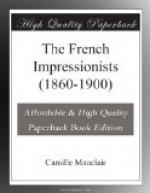What we shall have to thank Impressionism for, will be moral and material advantages of considerable importance. Morally it has rendered an immense service to all art, because it has boldly attacked routine and proved by the whole of its work that a combination of independent producers could renew the aesthetic code of a country, without owing anything to official encouragement. It has succeeded where important but isolated creators have succumbed, because it has had the good fortune of uniting a group of gifted men, four of whom will count among the greatest French artists since the origin of national art. It has had the qualities which overcome the hardest resistance: fecundity, courage and sure originality. It has known how to find its strength by referring to the true traditions of the national genius, which have happily enlightened it and saved it from fundamental errors. It has, last, but not least, inflicted an irremediable blow on academic convention and has wrested from it the prestige of teaching which ruled tyrannically for centuries past over the young artists. It has laid a violent hand upon a tenacious and dangerous prejudice, upon a series of conventional notions which were transmitted without consideration for the evolution of modern life and intelligence. It has dared freely to protest against a degenerated ideal which vainly parodied the old masters, pretending to honour them. It has removed from the artistic soul of France a whole order of pseudo-classic elements which worked against its blossoming, and the School will never recover from this bold contradiction which has rallied to it all the youthful. The moral principle of Impressionism has been absolutely logical and sane, and that is why nothing has been able to prevent its triumph.
Technically Impressionism has brought a complete renewal of pictorial vision, substituting the beauty of character for the beauty of proportions and finding adequate expression for the ideas and feelings of its time, which constitutes the secret of all beautiful works. It has taken up again a tradition and added to it a contemporary page. It will have to be thanked for an important series of observations as regards the analysis of light, and for an absolutely original conception of drawing. Some years have been wasted by painters of little worth in imitating it, and the Salons, formerly encumbered with academic pastiches, have been encumbered with Impressionist pastiches. It would be unfair to blame the Impressionists for it. They have shown by their very career that they hated teaching and would never pretend to teach. Impressionism is based upon irrefutable optic laws, but it is neither a style, nor a method, likely ever to become a formula in its turn. One may call upon this art for examples, but not for receipts. On the contrary, its best teaching has been to encourage artists to become absolutely independent and to search ardently for their own individuality. It marks the decline of the School, and will not create a new one which would soon become as fastidious as the other. It will only appear, to those who will thoroughly understand it, as a precious repertory of notes, and the young generation honours it intelligently by not imitating it with servility.




